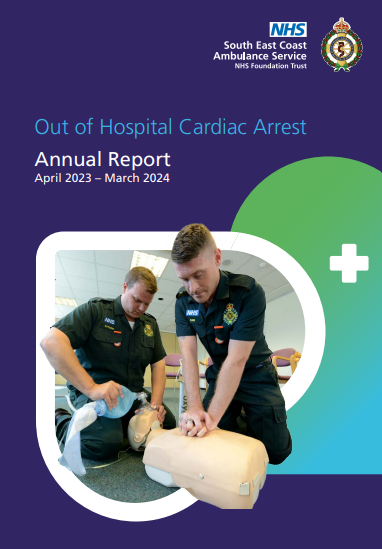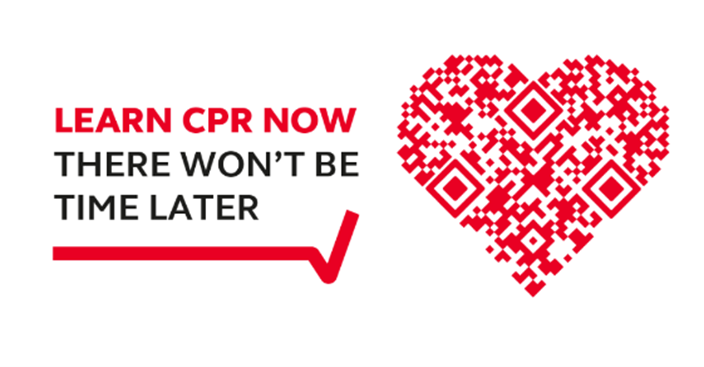 A Chatham man is adding his voice to calls for more people learn how to save a life after being reunited with the ambulance team who rushed to his aid.
A Chatham man is adding his voice to calls for more people learn how to save a life after being reunited with the ambulance team who rushed to his aid.
Chris Mills, 77, and wife, Brenda, were special guests as South East Coast Ambulance Service (SECAmb) revealed its highest-ever and national-leading cardiac arrest survival rate at the launch of its latest out-of-hospital cardiac arrest annual report.
As it looks to further improve survival figures, SECAmb is urging the public to sign up to a local life-saving course near them and for anyone with first aid training or more to sign up to GoodSAM – an app it and other ambulance services uses to alert individuals to nearby cardiac arrests.
Gathering at the Trust’s Medway ambulance hub in Gillingham on Valentine’s Day and as part of February’s Heart Month, Chris and Brenda thanked the SECAmb team and backed SECAmb’s focus on increasing cardiopulmonary resuscitation (CPR) awareness and bystander CPR.
Bystander CPR was key to Chris’s survival as off-duty Medway Maritime Hospital nurse, Rachael Lewis, was quick to commence chest compressions before the arrival of ambulance teams when Chris collapsed at Chatham Dockside on 12 October 2024.
Thanks to Rachael’s quick thinking and actions, Chris, who received one shock with a defibrillator and specialist treatment from SECAmb and hospital teams, has gone on to make a good recovery.
The public has played a vital role in the increased survival to 30 days rate of 11.5 per cent in 2023/24. It is the highest rate recorded by an English ambulance service, a two per cent increase on the previous year, and represents 307 lives saved. It is the third consecutive year that the Trust’s survival figure has been above the national average.
Between 1 April 2023 and 31 March 2024, SECAmb attended 9,065 cardiac arrests. Resuscitation was able to be commenced or continued by SECAmb ambulance crews on 2,709 of these patients – an average of more than one cardiac arrest every hour and close to one resuscitation attempt every three hours.
In addition to overall survival rates, Return of Spontaneous Circulation (ROSC) is also recorded. In 2023/24 SECAmb achieved a ROSC in 44 per cent of resuscitation attempts. However, success in resuscitation is not simply whether a ROSC is achieved but if it is maintained. Some 29 per cent of SECAmb resuscitation attempts maintained a ROSC to hospital (793 patients) – often giving families and friends time with loved ones they may not have had.
Interim Deputy Chief Medical Officer and Consultant Paramedic for SECAmb, Dan Cody said: “We are really pleased to see an increase in our cardiac arrest survival rate. It can take a whole community to save a life and the public, our volunteers, my colleagues, and our expert hospital teams, are all vital links in the chain of survival.
“Seeing our patients, such as Chris, be reunited with the teams that helped save their lives is a very clear reminder that behind the figures of our report are stories of individuals back living with their families, returning to work and getting back to their everyday activities.
“I would urge everyone to take the time to learn how to save a life and be willing to begin bystander CPR. Actions taken in the minutes prior to our arrival significantly increase a person’s chance of survival.
“Today I also make a call to action to anyone from a medical profession and lay-people with first-aid training certificates to sign up to GoodSAM and help us save more lives together in your local community. I would also ask that communities and businesses invest in public access defibrillators and ensure they are registered with the British Heart Foundation’s Circuit network.”
Senior Programme Manager of the British Heart Foundation’s Community Resuscitation Team, Sam Kennard, said: “This report vividly demonstrates that early CPR and defibrillation can be the difference between life and death when someone has a cardiac arrest.
“None of us want to imagine being in that situation, but with 80 percent of out-of-hospital cardiac arrests happening inside the home, it’s most likely that it would be a friend or family member depending on our help.
“That’s why it’s so vital that we all know CPR and why we are urging people this Heart Month to spend just 15 minutes learning this simple, lifesaving skill by using our RevivR online tool.”
Report figures at a glance
- Bystander CPR commenced on 77 per cent of resuscitations (non EMS witnessed) – 2 percent down on previous year but above national average of 70 per cent
- 223 defibrillators used before ambulance arrival
- 68 per cent male, median age 68
- 32 per cent female, media age 71
- An average of 226 resuscitation attempts each month
- January busiest month with 314 attempts
- 869 resuscitation attempts on patients under the age of 60
- Mean response time for resuscitation attempts – 9 minutes 36 seconds – 59 seconds quicker than previous year
- Mean response time for resuscitation attempts assigned as a Category 1 call, 8 minutes 51 seconds – 46 seconds quicker than previous year
- Attended 43 per cent of Category 1 assigned resuscitation attempts within 7 minutes
- In cases where a CFR was first on scene, response times were on average 4 minutes and 13 seconds faster compared to the next arriving vehicle
- Patients who survived were responded to on average 1 minute 52 seconds faster
In person CPR training is available throughout the UK from multiple organisations, while both the BHF and the Resuscitation Council UK offer online training in CPR and defibrillator use.
The British Heart Foundation has an online training tool, RevivR, a free and easy-to-use 15-minute training course – https://bit.ly/4a0V8T6
 The Resuscitation Council has created a “CPQR code” – a heart shaped QR code that directs people to a short video on how to do CPR.
The Resuscitation Council has created a “CPQR code” – a heart shaped QR code that directs people to a short video on how to do CPR.
Face-to-face first aid and CPR courses can also be booked through St John Ambulance and the British Red Cross.
Communities and businesses are urged to ensure public access defibrillators are registered with the BHF’s Circuit network. More details here: The Circuit – the national defibrillator network – BHF
